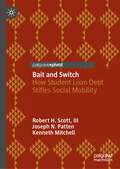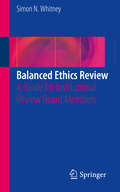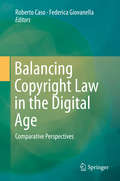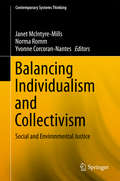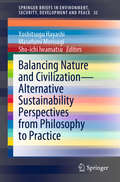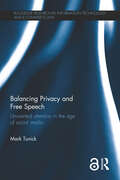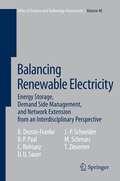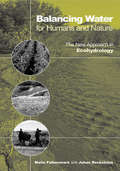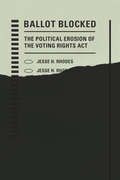- Table View
- List View
Bait and Switch: How Student Loan Debt Stifles Social Mobility
by Joseph N. Patten Robert H. Scott, III Kenneth MitchellThis book traces how the student loan system has created insurmountable student debt traps for millions of student borrowers contrary to its original purpose of promoting social mobility. Today, approximately 45 million Americans hold over $1.7 trillion in student loan debt, with over 20% of borrowers in default. Student loan debt has the greatest negative impact of wealth-poor students, with Black and first-generation students less likely to attain a college degree, more likely to default on student loan debt, and less likely to gain the same type of wage premium from their college degrees than white student loan borrowers. The book also offers a wide range of policy solutions for remedying the student loan debt crisis.
Balance and Limitation of Intellectual Property Protection in China: The Latest Law Amendments and Judicial Development Under Micro-comparative Perspectives
by Chenguo ZhangThe book focuses the openness of Chinese copyright law and patent law, namely the right limitation and exception rules (as the IP-internal balancing mechanism) and the right enforcement and protection (as the IP-external balancing mechanism). It examines the highlights of the 3rd and 4th amendments to the Chinese copyright law, patent law and the trademark law, addressing the most debated questions during these amendments. This book also takes a comparative approach to study the legislations and case laws in the USA, EU and China. The comparison covers the legislation, case decisions, which could offer useful clues for legislators to revise the current law, for judges to decide the cases about relevant topics and lay down their market plans. Moreover, this study also provides several recommendations for the right holders who are currently operating or planning to operate in China, regarding the de facto protection levels of their IP rights, the risks of right infringement and litigation costs as well as the trend of the goalsetting in their intellectual property strategy.
Balanced Ethics Review: A Guide for Institutional Review Board Members
by Simon N. WhitneyThis manual will help Institutional Review Boards (IRBs) conduct ethics review that balances the major moral considerations in research with human subjects. Current challenges in the IRB environment are addressed with arguments and insights from dozens of scholars. Useful to the IRB member at any level of experience, Balanced Ethics Review provides the necessary tools needed to create a systemic blueprint for promoting the research and dissemination of scientists and scholars within the standard norms of regulation.
Balancing Constitutional Rights
by Jacco BomhoffThe language of balancing is pervasive in constitutional rights jurisprudence around the world. In this book, Jacco Bomhoff offers a comparative and historical account of the origins and meanings of this talismanic form of language, and of the legal discourse to which it is central. Contemporary discussion has tended to see the increasing use of balancing as the manifestation of a globalization of constitutional law. This book is the first to argue that 'balancing' has always meant radically different things in different settings. Bomhoff uses detailed case studies of early post-war US and German constitutional jurisprudence to show that the same unique language expresses both biting scepticism and profound faith in law and adjudication, and both deep pessimism and high aspirations for constitutional rights. An understanding of these radically different meanings is essential for any evaluation of the work of constitutional courts today.
Balancing Copyright Law in the Digital Age: Comparative Perspectives
by Roberto Caso Federica GiovanellaThis book focuses on the thorny and highly topical issue of balancing copyright in the digital age. The idea for it sprang from the often heated debates among intellectual property scholars on the possibilities and the limits of copyright. Copyright law has been broadening its scope for decades now, and as a result it often clashes with other rights (frequently, fundamental rights), raising the question of which right prevails. The papers represent the product of intensive research by experts, who employ rigorous interpretative methodologies while keeping an eye on comparison and on the impacts of new technologies on law. The contributions concentrate on the "propertization" of copyright; on the principle of exhaustion of the distribution right; on the conflict between users' privacy and personal data needs; and on the balance between copyright and academic freedom. Starting from the difficulties inherently connected to the difficult task of balancing rights that respond to opposing interests, each essay analyzes techniques and arguments applied by institutional decision-makers in trying to solve this dilemma. Each author applies a specific methodology involving legal comparison, while taking into account the European framework for copyright and related rights. This work represents a unique piece of scholarship, in which a single issue is read through different lenses, demonstrating the need to reconcile copyright with other fundamental areas of law.
Balancing Individualism and Collectivism: Social and Environmental Justice (Contemporary Systems Thinking)
by Norma Romm Janet Mcintyre-Mills Yvonne Corcoran-NantesThis book addresses the social and environmental justice challenge to live sustainably and well. It considers the consequences of our social, economic and environmental policy and governance decisions for this generation and the next. The book tests out ways to improve representation, accountability and re-generation. It addresses the need to take into account the ethical implications of policy and governance decisions in the short, medium and long term based on testing out the implications for self, other and the environment. This book recognizes the negative impact that humans have had on the Earth's ecosystem and recommends a less anthropocentric way of looking at policies and governance. The chapters discuss the geologic impact that people have had on the globe, both positive and negative, and brings awareness to the anthropocentric interventions that have influenced life on Earth during the Holocene era. Based on these observations, the authors discuss original ideas and critical reviews on ways to govern those who interpret the world in terms of human values and experience, and to conduct an egalitarian lifestyle. These ideas address the growing rise in the size of the ecological footprints of some at the expense of the majority, the growth in unsustainable food choices and of displaced people, and the need for a new sense of relationship with nature and other animals, among other issues. The chapters included in Balancing Individualism and Collectivism: Social and Environmental Justice encourage readers to challenge the sustainability agenda of the anthropocentric life. Proposed solutions to these unsustainable actions include structuralized interventions and volunteerism through encouragement and education, with a focus on protecting current and future generations of life through new governmental etiquette and human cognizance.
Balancing Nature and Civilization - Alternative Sustainability Perspectives from Philosophy to Practice (SpringerBriefs in Environment, Security, Development and Peace #32)
by Yoshitsugu Hayashi Masafumi Morisugi Sho-Ichi IwamatsuThis book is an outcome of an international symposium: Sustainability –Can We Design the Future of Human Life and the Environment? which was held as a satellite event of the “Love the Earth”-Expo 2005 (Aichi, Japan). Each chapter is based on the lecture given by the following eminent researchers: Yoshinori Ishii, Hans-Peter Dürr, Yoshinori Yasuda, Minoru Kawada, Yasunobu Iwasaka, Werner Rothengatter, Hisae Nakanishi, Yang Dongyuan, Lee Schipper, Itsuo Kodama, and Yoshitsugu Hayashi.In the Part I titled “A Sustainable Relationship between Nature and Humans”, we discuss what will become of fossil fuels and petroleum, and what kind of indicators should be used to monitor the energy expended by human society. We then discuss environmental impacts caused by different civilizations and values on Nature and ethics, based on the perspective of environmental archaeology and on the discussions by Kunio Yanagita, the father of Japanese folklore study.The Part II is titled and shows “International Conflict Concerning Environmental Damage and Its Causes”. The Asian dust (Kosa) is a typical example of transboundary conflicts between nations. Another example can be found in the EU’s attempt to put in place a common motorway toll system across EU countries having different geographical and economic conditions. Finally, Part III covers the opinions and further debates on sustainable future earth based on the lectures in Parts I and II.We hope that great insights in this book will come across to readers, and be of help in steering the world towards a sustainable society in harmony with biosystems on earth.
Balancing Privacy and Free Speech: Unwanted Attention in the Age of Social Media (Routledge Research in Information Technology and E-Commerce Law)
by Mark TunickIn an age of smartphones, Facebook and YouTube, privacy may seem to be a norm of the past. This book addresses ethical and legal questions that arise when media technologies are used to give individuals unwanted attention. Drawing from a broad range of cases within the US, UK, Australia, Europe, and elsewhere, Mark Tunick asks whether privacy interests can ever be weightier than society’s interest in free speech and access to information. Taking a comparative and interdisciplinary approach, and drawing on the work of political theorist Jeremy Waldron concerning toleration, the book argues that we can still have a legitimate interest in controlling the extent to which information about us is disseminated. The book begins by exploring why privacy and free speech are valuable, before developing a framework for weighing these conflicting values. By taking up key cases in the US and Europe, and the debate about a ‘right to be forgotten’, Tunick discusses the potential costs of limiting free speech, and points to legal remedies and other ways to develop new social attitudes to privacy in an age of instant information sharing. This book will be of great interest to students of privacy law, legal ethics, internet governance and media law in general.
Balancing Renewable Electricity: Energy Storage, Demand Side Management, and Network Extension from an Interdisciplinary Perspective (Ethics of Science and Technology Assessment #40)
by Christian Rehtanz Bert Droste-Franke Jens-Peter Schneider Miranda Schreurs Dirk Uwe Sauer Thomas Ziesemer Boris P. PaalAn important aim behind the restructuring of Germany's and Europe's electricity systems is to reduce the environmental burden, especially with respect to greenhouse gas emissions, of the current systems. Emissions must be brought down to a level that is sustainable in the long run and consistent with greenhouse gas emission reduction goals. Meeting these goals will require a system (as best as current knowledge suggests) that will be able to cope simultaneously with the fundamental demands for economic efficiency, environmental sustainability and supply security. Making use of existing scenarios, this study sketches such a system. It focuses in particular on auxiliary systems such as energy storage methods and network extensions. The study introduces technologies that can balance electricity in energy systems and that can serve as enabling technologies for the integration of large quantities of renewable energies in the power supply system. It begins with a discussion of normative aims for the future electricity system before continuing with a description of current policies and political developments and an overview of relevant existing energy system studies. These sections serve as background for the remainder of the study. They are followed by discussion and analysis of the growing demand for means to balance the fluctuations found in electricity generated in power systems with a high penetration of renewable energies, the potentials of diverse technologies, requirements for electrical networks, economic impacts and important legal issues. Finally, the main challenges to the achievement of developing balancing technologies and processes for renewable electricity-dominant systems are summarised and recommendations made.
Balancing Water for Humans and Nature: The New Approach in Ecohydrology
by Johan RockstromBalancing Water for Humans and Nature, authored by two of the world's leading experts on water management, examines water flows - the 'blood stream' of both nature and society - in terms of the crucial links, balances, conflicts and trade-offs between human and environmental needs. The authors argue that a sustainable future depends fundamentally on our ability to manage these trade-offs and encourage long-term resilience. They advocate an ecohydrological approach to land/water/environmental problems and advance a strong, reasoned argument for viewing precipitation as the gross fresh water resource, ultimately responsible for sustaining all terrestrial and aquatic ecosystem services. This book makes the most coherent and holistic argument to date for a new ecological approach to understanding and managing water resources for the benefit of all. Basing their analysis on per capita needs for an acceptable nutritional diet, the authors analyse predictions of the amounts of water needed for global food production by 2050 and identify potential sources. Drawing on small-scale experiences in Africa and Asia, they also cover the vulnerability of the semi-arid tropics through a simplified model of green and blue water scarcity components.
Balco Atlantico
by Jérôme FerrariIn a village square in Corsica lies the body of ardent nationalist, Stéphane Campana, shot down at close range. And over his body weeps Virginie, the young woman who has venerated Stéphane all her life - a veneration that has led her to abandon herself to him and his twisted desires completely.Meanwhile, brother and sister Khaled and Hayet, who once gazed out to sea from the shoreline path known as "Balco Atlantico" and dreamed of a better future, are now stranded in Corsica. As Ferrari traces the history of Stéphane and Virginie that leads to the shooting in the village square, we encounter the story of Khaled and Hayet and see through their story and the stories of many others in this one Corsican square how a relentless pursuit of happiness and fulfilment can bring us perilously close to despair and disillusionment.
Balco Atlantico
by Jérôme FerrariIn a village square in Corsica lies the body of ardent nationalist, Stéphane Campana, shot down at close range. And over his body weeps Virginie, the young woman who has venerated Stéphane all her life - a veneration that has led her to abandon herself to him and his twisted desires completely.Meanwhile, brother and sister Khaled and Hayet, who once gazed out to sea from the shoreline path known as "Balco Atlantico" and dreamed of a better future, are now stranded in Corsica. As Ferrari traces the history of Stéphane and Virginie that leads to the shooting in the village square, we encounter the story of Khaled and Hayet and see through their story and the stories of many others in this one Corsican square how a relentless pursuit of happiness and fulfilment can bring us perilously close to despair and disillusionment.
Balkan Yearbook of European and International Law 2019 (Balkan Yearbook of European and International Law #2019)
by Ivana Kunda Dušan V. Popović Zlatan Meškić Enis OmerovićThe first issue of the Balkan Yearbook of European and International Law (BYEIL) focuses on international commercial and investment arbitration as one of the fastest developing fields of law in Southeast Europe. Covering a range of topics, the contributions analyze transparency and confidentiality in international commercial and investment arbitration in national, EU and international contexts. In addition, it compares the commercial arbitration laws and rules in Bosnia and Herzegovina with the international developments in this area.The papers published in the permanent sections on European Law and International Law explore contemporary challenges in public and private law disciplines, offering new perspectives on old concepts.
Balkan Yearbook of European and International Law 2020 (Balkan Yearbook of European and International Law #2020)
by Ivana Kunda Dušan V. Popović Zlatan Meškić Enis OmerovićThe second volume of the Balkan Yearbook of European and International Law (BYEIL) focuses on the United Nations Convention on Contracts for the International Sale of Goods (CISG), which was signed 40 years ago. The contributions analyse a broad range of aspects and reflect the latest developments; those in the permanent sections on European Law and International Law explore contemporary challenges in public and private law disciplines, offering fresh new perspectives on established concepts.
Balkan Yearbook of European and International Law 2021 (Balkan Yearbook of European and International Law #2021)
by Ivana Kunda Dušan V. Popović Zlatan Meškić Enis OmerovićThis third volume of the Balkan Yearbook of European and International Law (BYEIL) is devoted in particular to the specific legal challenges faced by Southeast European countries in the area of intellectual property law. The authors discuss a range of topics in Serbian and Bosnian and Herzegovinian copyright law, trademark and patent law, the relevance of which extends beyond their national borders. The papers included in the permanent sections on European law and international law explore contemporary challenges in public and private law. These challenges concern various legal fields, including consumer law, commercial law, corporate and criminal law, and the corresponding papers tackle a number of fundamental theoretical issues, while also highlighting the latest developments in legal practice.
Balkan Yearbook of European and International Law 2022 (Balkan Yearbook of European and International Law #2022)
by Ivana Kunda Dušan V. Popović Zlatan Meškić Enis OmerovićThe fourth volume of the Balkan Yearbook of European and International Law (BYEIL) presents nine new articles offering scholarly insights into a variety of legal issues, with a special focus on the countries of Southeast Europe. All six articles in the special section reflect the authors’ efforts to untangle difficult questions concerning family property in private international law. Addressing a range of topics, leading national experts in the respective areas discuss Bosnian and Herzegovinian, Croatian, Greek, Lithuanian and Turkish law. In turn, the general sections on European law and international law include three articles on diverse topics in private and public law, from a fresh take on the legal and practical effects of Brexit over EUTMs, and the legal nature of cryptocurrencies in different jurisdictions, to difficulties establishing the rule of law in Bosnia and Herzegovina.
Balkan Yearbook of European and International Law 2023 (Balkan Yearbook of European and International Law #2023)
by Ivana Kunda Dušan V. Popović Zlatan Meškić Enis OmerovićThe fifth volume of the Balkan Yearbook of European and International Law (BYEIL) discusses diverse and actual legal topics of international and comparative dimensions and angles. The BYEIL 2023 focuses on the special topic of Human Rights at Multiple Levels and contributes to the extensively researched field characterised by emerging trends, with the authors providing a deeper and more concise understanding of human rights-related issues. Discussions surrounding indivisibility, interdependence, universalism versus cultural relativism inevitably led to exploring human rights at various levels. The two permanent sections on European Law and International Law deal with recent developments in these highly dynamic and developing areas. They serve as a forum for scholarly discourse on these topics from the South-East European perspective.
Balkan Yearbook of European and International Law 2024 (Balkan Yearbook of European and International Law #2024)
by Ivana Kunda Dušan V. Popović Enis Omerović Zlatan MeskićThe special section of the BYEIL 2024 is devoted to the topic: Sustainability and Law. The special topic aims to contribute to the research field with emerging trends by providing a deeper and more compact understanding of the interplay between law and sustainable goals. The UN adopted the 2030 Agenda that embodied sustainable consumption and production patterns as one of the 17 Sustainable Development Goals (SDG). SDG 16 is directly related to law and includes peace, inclusive societies, access to justice and effective and accountable institutions. The authors made contributions to the various fields related to various SGDs providing insights into the ways in which these goals may inform policymaking, regulatory frameworks and judicial practice.
Ballistics: Theory and Design of Guns and Ammunition
by Donald E. Carlucci Sidney S. JacobsonBallistics examines the analytical and computational tools for predicting a weapon’s behavior in terms of pressure, stress, and velocity, demonstrating their applications in ammunition and weapons design. It includes updated and revised equations, end-of-chapter problems, case studies, and practical examples.Explaining the physics of a gun launch, the book describes the behavior of the propelling charge that moves the projectile through the gun tube and the necessary methods to calculate how the projectile will fly. The new edition features a new chapter on closed vessel experimentation and analysis, which discusses closed bomb testing to incorporate new propellants into interior ballistics designs. It covers the mathematical fundamentals that are key to developing a safe and reliable gun system.With its thorough coverage of interior, exterior, and terminal ballistics, this new edition continues to be the standard resource for ballistics experts and researchers studying the technology of guns and ammunition and designing state-of-the-art propellants.Instructors will be able to utilize a Solutions Manual and Figure Slides for their course.
Ballistics: Theory and Design of Guns and Ammunition, Third Edition
by Donald E. Carlucci Sidney S. JacobsonWith new chapters, homework problems, case studies, figures, and examples, Ballistics: Theory and Design of Guns and Ammunition, Third Edition encourages superior design and innovative applications in the field of ballistics. It examines the analytical and computational tools for predicting a weapon’s behavior in terms of pressure, stress, and velocity, demonstrating their applications in ammunition and weapons design. New coverage in the Third Edition includes gas-powered guns, and naval ordinance. With its thorough coverage of interior, exterior and terminal ballistics, this new edition continues to be the standard resource for those studying the technology of guns and ammunition.
Ballot Blocked: The Political Erosion of the Voting Rights Act
by Jesse H. RhodesVoting rights are a perennial topic in American politics. Recent elections and the Supreme Court's decision in Shelby County v. Holder, which struck down key enforcement provisions in the Voting Rights Act (VRA), have only placed further emphasis on the debate over voter disenfranchaisement. Over the past five decades, both Democrats and Republicans in Congress have consistently voted to expand the protections offered to vulnerable voters by the Voting Rights Act. And yet, the administration of the VRA has become more fragmented and judicial interpretation of its terms has become much less generous. Why have Republicans consistently adopted administrative and judicial decisions that undermine legislation they repeatedly endorse? Ballot Blocked shows how the divergent trajectories of legislation, administration, and judicial interpretation in voting rights policymaking derive largely from efforts by conservative politicians to narrow the scope of federal enforcement while at the same time preserving their public reputations as supporters of racial equality and minority voting rights. Jesse H. Rhodes argues that conservatives adopt a paradoxical strategy in which they acquiesce to expansive voting rights protections in Congress (where decisions are visible and easily traceable) while simultaneously narrowing the scope of federal enforcement via administrative and judicial maneuvers (which are less visible and harder to trace). Over time, the repeated execution of this strategy has enabled a conservative Supreme Court to exercise preponderant influence over the scope of federal enforcement.
Bandit Capitalism: Carillion and the Corruption of the British State
by Bob Wylie“Comparable with Michael Lewis’ The Big Short or indeed Ian Fraser’s Shredded, Bob Wylie has done a forensic job . . . a powerful book.” —Talk Media PodcastThe collapse in January 2018 of the construction giant Carillion, outsourcer of huge Government building contracts, is one of the great financial scandals of modern times. When it folded it had only £29 million in the bank and debts and other liabilities adding up to a staggering £7 billion. When the total losses were counted it was established that the banks were owed £1.3 billion in loans and that there was a hole in the pension fund of £2.6 billion. That left British taxpayers picking up the tab to salvage the pensions owed to Carillion workers.On one level, this is a familiar story of directors who systematically looted a company with the aim of their own enrichment. But in a wider context the Carillion catastrophe exposes everything that is wrong about the state we are in now—the free-for-all of company laws which govern directors’ dealings, the toothless regulators, the crime and very little punishment of the Big Four auditors, and a government which is a prisoner of a broken model born of a political ideology which it cannot forsake. Through the story of Carillion, Bob Wylie exposes the lawlessness of contemporary capitalism that is facilitated by hapless politicians, and gives a warning for the future that must be heeded. Bandit Capitalism charts, in jaw-dropping detail, the rise and rise of the British Oligarchy.“An excoriating book on the corruption that can lurk within contemporary capitalism.” —Financial Times, “Best Books of 2020”
Bandits and Bureaucrats The Ottoman Route the State Centralization
by Karen BarkeyDiscusses the process of state-building in the Ottoman Empire.
Bandung, Global History, and International Law: Critical Pasts and Pending Futures
by Partha Chatterjee Michael Fakhri Luis Eslava Vasuki Nesiah Abi-Saab GeorgesIn 1955, a conference was held in Bandung, Indonesia that was attended by representatives from twenty-nine nations. Against the backdrop of crumbling European empires, Asian and African leaders forged new alliances and established anti-imperial principles for a new world order. The conference came to capture popular imaginations across the Global South and, as counterpoint to the dominant world order, it became both an act of collective imagination and a practical political project for decolonization that inspired a range of social movements, diplomatic efforts, institutional experiments and heterodox visions of the history and future of the world. In this book, leading international scholars explore what the spirit of Bandung has meant to people across the world over the past decades and what it means today. It analyzes Bandung's complicated and pivotal impact on global history, international law and, most of all, justice struggles after the end of formal colonialism.
Banging on the Walls of the Tank: Dispatches from Gaza
by Haidar EidBanging on the Walls of the Tank is a collection of reflections and analysis written over eighteen years in Gaza by Palestinian academic and activist, Haidar Eid. Providing an insider’s perspective on the blockade of Gaza since 2007, the Israeli attacks in 2009, 2012, 2014, and 2021, the Great March of Return, and the ongoing genocide committed by the apartheid Israeli state, Eid’s essays examine political alternatives, opportunities for resistance, and prospects for a just peace after more than a century of dispossession.
